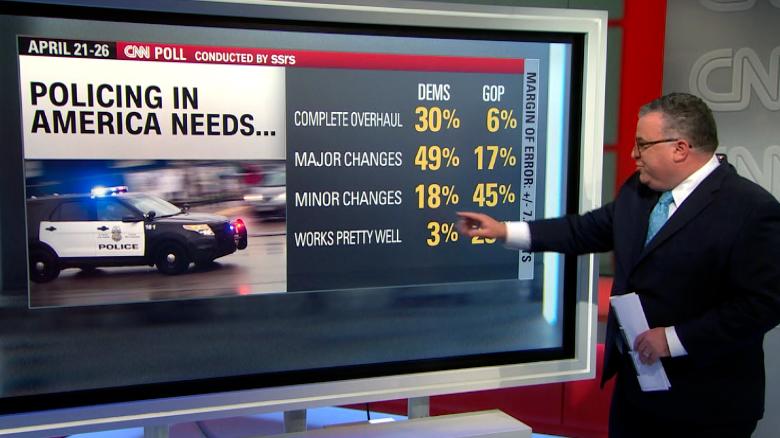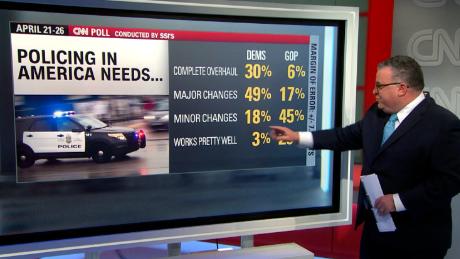(CNN)More than three-quarters of Americans say they are satisfied with the guilty verdict in the trial of former police officer Derek Chauvin for the murder of George Floyd last spring in Minneapolis, according to a CNN Poll conducted by SSRS. Just 16% are dissatisfied with the outcome.
But expectations for changes to the way Black people and other racial and ethnic minorities are treated in American society following the verdict are mixed (53% say they are likely, 43% unlikely), and most (55%) say their view of the nation's criminal justice system is unchanged by the verdict. And the survey finds sharp divisions by party in views on the verdict and policing.
Chauvin was found guilty on three charges after Floyd's death was captured on video by a teenager. President Joe Biden called the verdict "a giant step toward justice in America" but added that it wasn't enough, calling on Congress to pass more legislation and for America to face systemic racism in the country. The poll was fielded entirely after the verdict was announced one week ago.
The widest gap in satisfaction with the verdict comes along partisan lines. While 97% of Democrats and 77% of independents express satisfaction with the outcome, just 53% of Republicans feel the same way. Divides by race, age or gender are less stark. Black adults are broadly satisfied with the outcome (95%), but broad majorities of Latinos (78%) and Whites (74%) are as well. Women (81%) express more satisfaction than men (73%), and there are no significant differences by age.
According to the poll, most Americans, 53%, say that policing in America today needs major changes or a complete overhaul. Only 14% say policing works pretty well as it is and 32% say it needs minor changes. Among Black Americans, 82% say policing needs major changes or a complete overhaul, compared with 47% among White Americans. The gap is also large by party: Among Democrats, 79% think it needs major changes or a total overhaul, but that drops to just 23% among Republicans.
Overall, just 25% say the outcome of Chauvin's trial has improved their view of the US criminal justice system while nearly as many, 17%, say their view of the justice system has worsened as a result of the verdict. Republicans (35%) are most likely to say their view has worsened because of the outcome, while Democrats (39%) are more likely to say it has improved.
While a narrow majority of 53% say changes in the way Black people and other racial and ethnic minorities are treated in American society are likely, only 11% say such changes are "very likely," while more, 18%, say they are not at all likely.
Last summer, Americans had greater expectations that the protests that sprang up in the wake of Floyd's death would lead to real changes in the treatment of racial and ethnic minorities in America. A late-summer CNN poll found that 60% felt it was likely those changes would happen, 7 points higher than the share of those who feel change is likely post-verdict in the new poll.
As was true last summer, the new poll finds that Democrats (60% likely) are more likely than Republicans (47%) or independents (51%) to say such change is likely, but there is little difference in expectations between White adults (51% likely) and Black adults (54% likely).
The methodology and weighting for this poll have been modified compared with CNN polls conducted before 2021. Interviews conducted on cell phones made up 75% of the total, up from 65% in prior surveys. Dialing extended over six days rather than four days, allowing for more effort to be made to contact those who are not easily reachable. Demographic weighting was adjusted to account for more discrete education categories broken out by race, and a geographic weight was applied to ensure representative distribution by population density. In addition, results were weighted for partisan identification and lean among independents, with targets computed using an average of the current poll plus four recent CNN polls.
The new CNN Poll was conducted by SSRS April 21 through 26 among a random national sample of 1,004 adults reached on landlines or cellphones by a live interviewer. Results for the full sample have a margin of sampling error of plus or minus 3.6 percentage points.


















